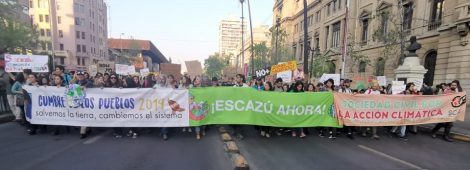The Peoples´ Summit [1] together with Fridays for Future Chile and the Civil Society for Climate Action (SCAC) were three of the coalitions which called over 100 thousand demonstrators to participate in the Global Climate Strike [2] on September 27 in Chile.
“This march was a historic event at national level for the struggle for a healthy environment”, stated members of the Peoples´ Summit, specifically making reference to the participation of youth.
Ximena Salinas, Chair of CODEFF-Friends of the Earth Chile [3], highlighted the main demands of social, political, union, environmental, cultural and territorial organizations: Declaring a climate and environmental emergency in Chile; immediate closure of coal-powered thermal power stations and the repeal of the Water Law, promotion of native species of trees and approval of the Escazú Agreement.
The massive march “needs to be interpreted by authorities as a clear sign of the growing conviction about the need to take urgent measures in the country against climate change”, stressed the Peoples´ Summit in a statement.
In an interview with Real World Radio, Salinas criticized the “ambiguous discourse” of the Chilean government with reference to environmental policies and explained why a “climate change and environmental emergency law” is needed, including a series of measures to raise awareness and change public policies.
The central area of the country that will host the 25th Conference of the Parties to the UN Framework Convention on Climate Change (COP25) is severely affected by droughts and the lack of access to water, added to high pollution levels and health problems, such as heavy metal poisoning, vomits, dizziness, headaches, breathing problems, in sacrifice areas
Sacrifice areas [4] are geographic areas with large industrial complexes, where thermal power stations of foreign capitals tend to operate. In Chile, six communities (Iquique, Tocopilla, Mejillones, Huasco, Puchuncaví y Coronel) concentrate the 28 coal-powered thermal power stations responsible for 91 % of total carbon dioxide emissions (CO2) in the country. Of these 28 power stations, 15 are owned by AES-Gener (US), 8 belong to Engie (France) and 3 to Enel (Italy). The other 2 are owned by Chile.
ATTACKS
Moreover, in Valparaíso, the Peoples´ Summit denounced the attack against socioenvironmental activist Patrick Rojas Cancino, “who was kidnapped, beaten and tortured by Police officers” on September 28th while he was returning home after participating in a demonstration.
“The attacks lasted almost 3 hours. While kidnapped, Patrick was beaten, verbally abused and threatened by Police officers, who after being done with him decided to drown him. Right then, another police officer who was not involved in the torture talked to the other officers about “the problems that could entail”, and then one of the torturers said to Patrick “if you can walk, you can leave”. Patrick managed to walk out of the police station and arrive to Hospital Carlos Van Buren in Valparaíso to treat his injuries. Since Patrick requested help through social media, we managed to activate support networks to provide emotional, logistical and legal support to him and his family. Currently, Patrick´s life is no longer at risk, and he is surrounded by his family”, reported the Peoples´ Summit in a statement.
A few hours later, Patrick Rojas filed a protection appeal before a Valparaíso court.
The Summit also responded to the “violent attacks” by “hooded-men” at the march in Santiago, who reportedly infiltrated the demonstration to cause vandalism, and who attacked media workers.
